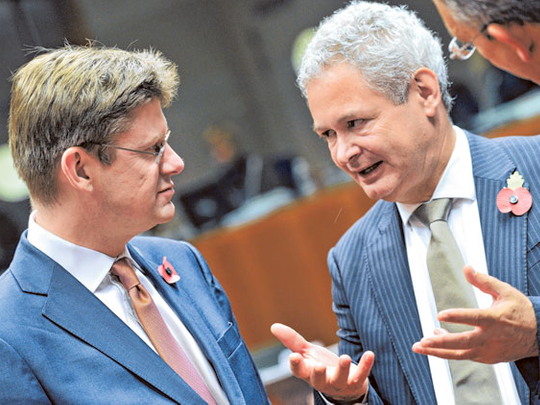
Brussels: European Union governments got a taste on Friday of the bitter battle to come on the bloc’s next long-term budget, as talks between EU negotiators on spending for this year and next came to a head.
The dispute over the 2013 budget and extra spending needs for 2012 is seen as a litmus test for a tricky EU summit on November 22-23, when leaders will try to agree the bloc’s next long-term budget for 2014-2020, worth almost 1 trillion euros (Dh4.75 trillion, $1.3 trillion).
“If we succeed in these negotiations now, we will create a better atmosphere for convergence and agreement in the (summit) negotiations,” said Cyprus’s deputy minister for EU affairs, Andreas Mavroyiannis, who will lead Friday’s talks.
“If not, I suppose this will poison a little bit the atmosphere. It’s never the end of the world, but let’s hope for the best,” he told Reuters ahead of the meeting.
In both sets of talks, top budget contributors, including Germany, France and Britain, want to limit proposed increases in EU spending to better reflect austerity policies at home.
The EU’s executive, the European Commission, and EU lawmakers have demanded a budget of 138 billion euros in 2013, representing a way-above-inflation 6.8 percent rise compared to this year.
Most national governments want to limit any increase to 2.8 percent, and have identified about 5 billion euros in cuts to proposed regional development aid and overseas spending in areas such as development assistance and trade promotion.
Britain warned that failure to limit next year’s budget rise would make it harder to agree on the bloc’s next multi-annual financial framework (MFF).
“From our point of view, the higher any increase in the annual budget, the less prospect there is for agreement on the seven-year MFF,” Britain’s junior finance minister, Greg Clark, told his EU colleagues.
One major incentive for net budget contributors to limit next year’s spending is the fact that if agreement on the 2014-2020 framework is delayed, the budget ceiling for 2013 will be automatically rolled over with an annual increase for inflation.
An added complication in Friday’s talks is a Commission request for an extra 9 billion euros in 2012, which it says is needed to fill a funding gap that threatens to cut off EU funds for education, infrastructure and research projects.
The new Dutch finance minister, Jeroen Dijsselbloem, said he doubted the Commission’s claim that the bloc would be unable to pay its bills without the extra money.
“I’d question that very much. The Commission has to re-prioritise, that’s just the way it is. Budgetary discipline is not just for the member states,” he told Reuters.
EU officials said a deal on the 2013 budget would not be possible without an agreement on the extra spending needs for this year.
If Friday’s talks fail to deliver, negotiators will have until midnight on November. 13 to reach a compromise. If that deadline is missed, the Commission would be forced to come up with a new proposal on next year’s budget.
If no deal is reached before the end of the year, the budget for 2012 would be divided into 12 equal amounts and paid monthly into the EU’s coffers, causing disarray in the bloc’s spending in areas such as agriculture.












